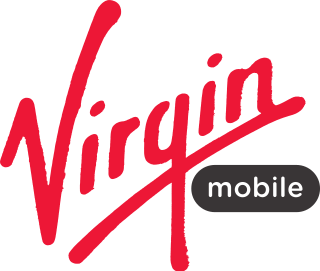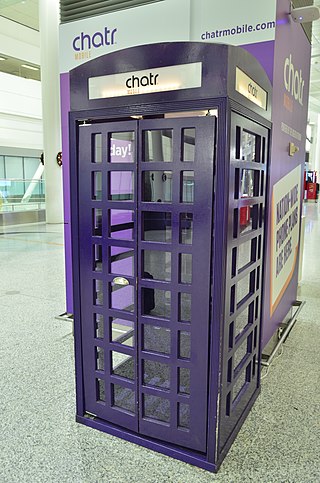A SIM lock, simlock, network lock, carrier lock or (master) subsidy lock is a technical restriction built into GSM and CDMA mobile phones by mobile phone manufacturers for use by service providers to restrict the use of these phones to specific countries and/or networks. This is in contrast to a phone that does not impose any SIM restrictions.

Roaming is a wireless telecommunication term typically used with mobile devices, such as mobile phones. It refers to a mobile phone being used outside the range of its native network and connecting to another available cell network.

Bell Mobility Inc. is a Canadian wireless network operator and the division of Bell Canada which offers wireless services across Canada. It operates networks using LTE and HSPA+ on its mainstream networks. Bell Mobility is the third-largest wireless carrier in Canada, with 10.1 million subscribers as of Q3 2020.
Local number portability (LNP) for fixed lines, and full mobile number portability (FMNP) for mobile phone lines, refers to the ability of a "customer of record" of an existing fixed-line or mobile telephone number assigned by a local exchange carrier (LEC) to reassign the number to another carrier, move it to another location, or change the type of service. In most cases, there are limitations to transferability with regards to geography, service area coverage, and technology. Location Portability and Service Portability are not consistently defined or deployed in the telecommunication industry.

Virgin Mobile is a wireless communications brand used by seven independent brand-licensees worldwide. Virgin Mobile branded wireless communications services are available in the United Kingdom, Ireland, Canada, Colombia, Chile, Kuwait, Saudi Arabia, United Arab Emirates, Poland and Mexico. Virgin Mobile branded services used to be offered in Australia, France, Singapore, India, Qatar, South Africa and the United States.
Rogers Wireless Inc. is a Canadian mobile network operator headquartered in Toronto, providing service nationally throughout Canada. It is a wholly owned subsidiary of Rogers Communications. The company had revenues of just under $15.1 billion in 2018. Rogers Wireless is the largest wireless carrier in Canada, with 13.7 million subscribers as of Q2 2023.

Fido Solutions Inc. is a Canadian mobile network operator owned by Rogers Communications. Since its acquisition by Rogers in 2004, it has operated as a Mobile virtual network operator (MVNO) using the Rogers Wireless network.

A prepaid mobile device, also known as a pay-as-you-go (PAYG), pay-as-you-talk, pay and go, go-phone, prepay, or burner phone, is a mobile device such as a phone for which credit is purchased in advance of service use. The purchased credit is used to pay for telecommunications services at the point the service is accessed or consumed. If there is no credit, then access is denied by the cellular network or Intelligent Network. Users can top up their credit at any time using a variety of payment mechanisms.

Virgin Mobile USA was a no-contract Mobile Virtual Network Operator. It used Sprint's network for coverage. It licensed the Virgin Mobile brand from United Kingdom-based Virgin Group. Virgin Mobile USA was headquartered in Kansas City, Missouri, and provided service to approximately 6 million customers.

Comcast Cable Communications, LLC, doing business as Xfinity, is an American telecommunications business segment and division of the Comcast Corporation. It is used to market consumer cable television, internet, telephone, and wireless services provided by the company. The brand was first introduced in 2010; prior to that, these services were marketed primarily under the Comcast name.
Sprint Canada was a Canadian telecommunications service provider active from 1993 until 2005, when it was acquired by Rogers Communications. It offered both residential and business services, and was a key company in the long-distance wars of Canada. It was based in Toronto.

Sprint Corporation was an American telecommunications company. Before being acquired by T-Mobile US on April 1, 2020, it was the fourth-largest mobile network operator in the United States, serving 54.3 million customers as of June 30, 2019. The company also offered wireless voice, messaging, and broadband services through its various subsidiaries under the Boost Mobile and Open Mobile brands and wholesale access to its wireless networks to mobile virtual network operators.
A mobile phone operator, wireless provider, or carrier is a mobile telecommunications company that provides wireless Internet GSM services for mobile device users. The operator gives a SIM card to the customer who inserts it into the mobile device to gain access to the service.

Virgin Plus is a Canadian provider of postpaid and prepaid wireless voice, text and data communications services throughout Canada. They also offer home Internet and TV services in select areas of Ontario and Quebec. Launched as Virgin Mobile Canada on March 1, 2005, as a joint venture between Virgin Group and BCE Inc., BCE took sole ownership on July 1, 2009, when it closed a deal to purchase the stake it did not already own. Virgin Plus calls its customers 'Members' and offers a Member Benefits program, which provides its customers with special offers, discounts, and VIP experiences.

Tethering or phone-as-modem (PAM) is the sharing of a mobile device's Internet connection with other connected computers. Connection of a mobile device with other devices can be done over wireless LAN (Wi-Fi), over Bluetooth or by physical connection using a cable, for example through USB.

Solo Mobile is a discontinued mobile virtual network operator in Canada started by Bell Mobility in 2000. Historically, Solo was considered a discount wireless brand, offering low price monthly plans with some unlimited options in certain cities. Its products and services were only sold in British Columbia, Alberta, Ontario and Quebec. The brand ceased advertising towards new customers since November 2011, and new activations were officially discontinued on May 17, 2012.

Koodo Mobile is a Canadian mobile flanker brand started by Telus in 2008 and mostly oriented toward younger customers. Koodo differs from its parent Telus by not requiring a fixed term contract. Koodo currently provides postpaid, prepaid, and wireless home phone services. Being a subsidiary of Telus, Koodo has been able to offer extensive coverage and a strong presence in mobile retailers. This allowed Koodo to gain a presence nationwide.

Freedom Mobile, a Canadian wireless telecommunications provider owned by Québecor, holds a 6% market share of the Canadian wireless market, primarily concentrated in urban areas of Ontario, British Columbia, Alberta, and Manitoba. As the fourth-largest wireless carrier in Canada, Freedom Mobile serves 2,290,497 subscribers as of November 30, 2022. In addition to mobile phone plans, Freedom also offers home internet and TV services.

Data and Audio-Visual Enterprises Wireless, d/b/a Mobilicity, was a Canadian mobile virtual network operator (MVNO) owned by Rogers Communications. Its name was a portmanteau of the words "mobility" and "simplicity". Mobilicity was one of several new mobile network operators, along with Public Mobile and Wind Mobile, which launched in Canada after a government initiative to encourage competition in the wireless sector. The carrier had over 250,000 Mobilicity subscriptions on May 16, 2013, the day in which Telus announced its failed attempt to acquire Mobilicity. The subscription count decreased to 157,000 by April 2015 according to court documents filed by Mobilicity's Chief Restructuring Officer in that month.

Chatr Mobile is a Canadian mobile virtual network operator owned by Rogers Communications Canada targeting entry-level customers. It is one of three wireless brands owned by Rogers Communications, including Rogers Wireless, and Fido Solutions. The provider launched its service in Toronto, Ottawa, Calgary, Edmonton, Vancouver, Quebec City, and Montreal under the name Chatr Wireless on July 28, 2010. The company re-branded to its current name in 2015.













